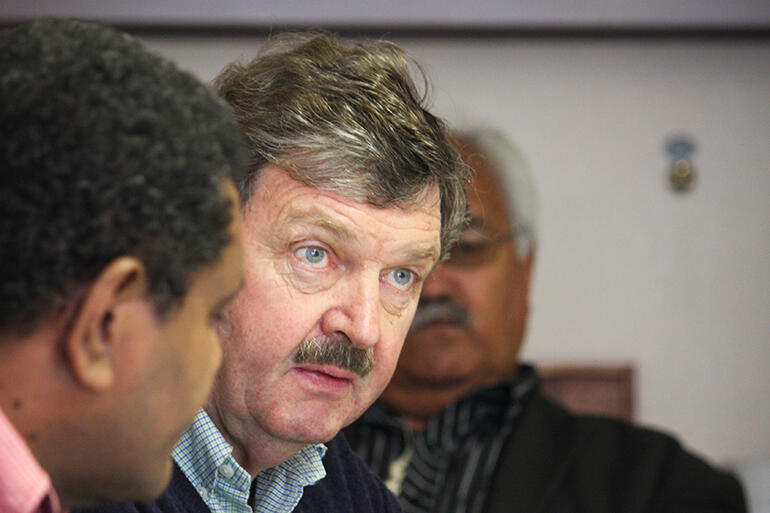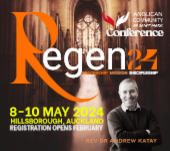

The Rev Charles Waldegrave has recently been installed as one of the team of three co-vicars[1] of St Peter’s, Willis St, in Wellington.
But that’s not the only string to his bow.
In fact, that’s a one-day-a-week job, which he’s added to his existing workload. Because Charles is not only an ordained and licensed priest, he’s also a qualified psychologist, and social policy researcher – he founded and leads the Lower Hutt-based Family Centre Social Policy Research Unit.
And if that wasn’t enough, he’s stuck his hand up for four of the new Anglican social justice ‘portfolio’ groups: the ones looking at employment, housing, the wellbeing of women and children, and of refugees in New Zealand.
Charles is the spokesperson for the employment group, and Lloyd Ashton asked him to sketch out the issues that most need attention on that front.
Tena koe, Charles: the latest stats show that the official unemployment rate here is just 4.8 percent, which is an eight-year low. So what’s the problem with that?
It’s great the number is that low.
But that figure is not an indication that the people employed have enough to feed their families.
Not at all.
Because as far as the official stats go, anyone who is in work for one hour a week is regarded as employed.
We have battled that way of measuring unemployment for years.
But you can’t win, because that’s the international standard.
There are very few people in the labour market for one hour a week, of course. But there’s quite a few in for 3–4–5 hours.
The point is, that 4.8 percent figure is a misnomer, and it’s not reflecting, at all, the insecurity that’s going on.
Insecurity?
Yes. Employment is a real problem here.
There are some global problems, and there are some specific to New Zealand.
What we have in New Zealand is a Welfare State based upon employment.
In technical terms, it’s what we call a ‘Residual Welfare State’ – which means the state helps out only as the last resort. People are expected to be employed.
For decades, government policy has been to get people off benefits as fast as possible – and they keep benefits low in order, they say, to create an incentive for beneficiaries to get a job.
Governments often say the way out of poverty is through employment – and in the past, that made some sense.
The problem with that now, though, is that even if you’ve got yourself off a benefit, and you’re in work, you can still be stuck in poverty.
In fact, MSD figures show that 40% of children in poverty in New Zealand are in households where one person is working 35 hours or more.
Why is that? Because we’ve got a real problem in New Zealand with low wages. We pay very low wages by comparison with other countries.
Governments of both left and right have tried to encourage employers to pay more – by paying better rates to public servants, for example – but that still doesn’t move the needle much.
So many New Zealand employers, not all, pay close to the minimum wage.
Which is why we’ve been so involved with a Living Wage movement. I don’t know if you realise, but we set the Living Wage at the Family Centre, each year[2].
This endemic low wage problem here is why, until the Australian economy got into a little bit of difficulty – which it will come out of, of course – everybody migrated over there.
Because you can be a cleaner in Australia, and still have a chance of buying a house.
So the New Zealand problem is that employment isn’t rewarding people at the lower end.
OK. So what’s the global problem?
It’s the impact of new technology on jobs – which one of the most senior Australian MPs has just described as “the defining anxiety of our time”[3].
Even the best experts can’t agree on which jobs, or how many, will be created or destroyed by the advance of new technologies.
But the most influential study, which came out of Oxford University in 2013, predicted that almost 50 percent of all jobs in the US are at risk of being automated[4].
We seemed to be able to ride the wave of moving from manufacturing to service industries.
But we’re not seeing the same riding of the wave as we move into really automated technologies – which are eating out middle management.
I’m over simplifying here – but what we now have at the top end are investors and senior managers, highly paid people…
Then you’ve got the people on the shop floor, and the connection between them and the people at the top is now largely automated.
And automation, artificial intelligence, has eaten out an enormous amount of employment, and often quite skilled employment, in the middle: the accountants and middle managers.
Now, a follow-on from that is that employers have found that is much easier to just contract people for so many hours, rather than give them full-time jobs, and security.
So you are now getting a lot of people who are working in three or four jobs, for so many hours a week in each, in order to make ends meet.
These contracts are often quite precarious, like: ‘We’ll take you if we need you. This week we might have six hours work, next week we might not need you at all, and the following week it might be eight hours’. That type of thing.
So what’s happened is now you’ve got young New Zealanders having children and bringing them up without the security of employment that we’ve had in the past. That has a huge effect.
That’s not all you are concerned about, is it?
No. Because not only have you got people in precarious work situations… you’ve got a parallel housing crisis.
People in precarious work situations can’t afford housing… so these two pressures combine to create enormous insecurity.
The crazy thing is that if you are like me and most other people, the time you earned least was when your kids were young. Our children’s brains are developing in those earliest years – and the reality for growing numbers of children is that they’re living in insecure environments during these crucial years.
By the time we get older many of us have established ourselves... we’ve built assets, got seniority and so on. That’s just the way the market goes.
It’s all the wrong way around.
We need to do all sorts of things to start addressing security for people.
Actually, there has to be a rethinking of the welfare state. The way it operates, and the sort of incentives that go on with employers, and an emphasis that ceases to be simply market-driven. We’ve obviously got to have an active market that produces well – but that needs to be balanced by a very substantial social policy.
#
We’ve got an extraordinary housing crisis going on in many, many New Zealand cities now.
And the government[5] has been defining that crisis as a market problem. They see it as a problem of supply, and so what we do is increase the supply, so there will be enough houses.
Now the problem with that is that a) they can’t increase the supply fast enough, and b) it doesn’t address the affordability issue.
So the housing crisis has to be seen as a social problem, as well as a market problem.
We need to develop all sorts of social housing. And I don’t think that the Housing New Zealand model is the best way of doing this.
Housing New Zealand has changed its rules, and can now kick you out once your kids have gone.
So you’ve rented for 25 years, paid nearly the cost of a house in rent, got nothing to show for it, and now you’re just thrown into the private market. That is no solution at all.
We obviously need to keep Housing New Zealand.
But the various community housing providers’ projects going on are much more exciting.
What they do, is give tenants some equity. So you get rent-to-buy schemes, and you get shared equity, and they help people into ownership.
Earlier this year we did a lot of work for the New Zealand Housing Foundation, in conjunction with BERL, the economic research group.
We wrote a paper which pointed out the extraordinary difference that happens with people who own their own houses, or have an equity stake, compared with what happens to people who simply rent.
We carried out a literature review of over 120 international studies[6], and when people have some sort of equity, the impact in terms of health, employment, staying out of trouble, how much tax they pay, all these things... it’s just so positive.
What can these new Anglican ‘portfolio’ groups do to make things better?
It’s very early days. We’re still feeling our way forward.
But essentially, I think what the Archbishops want is very good information, and solid advice. And then the groups would work out ways to articulate that.
The example that Archbishop Philip uses is what we did on the refugee submission to government, in which we sought an increase in New Zealand’s refugee intake[7].
He felt absolutely free to talk on that subject because he understood every angle of it. He had the research to back it up, he had all the New Zealand comparisons, so he could do it.
With the problems we face with employment, and housing… what we really need is for trade unions, businesses, government and key stakeholders to be talking together, and setting a goal to create the sort of security New Zealand needs to have a future for our children – for all of our children.
But at the moment there’s not even agreement on the problem – so getting stuff into that space will be really important.
And that’s something that the Bishops can really call for.
Put up a very logical argument, and call for it.
Try and get multiparty stuff happening, and be fair about it.
When you get all the key players coming together to work it through… it’s amazing what you can come up with if there is good will.
#
[1] With the Rev Jean Malcolm, and Archdeacon Stephen King.
[2] The Family Centre Social Policy Research Unit is hired by the Living Wage Aotearoa to calculate, in a transparent way – taking into account the costs of housing, food, transport etc – what the living wage should be each year. At the moment, the Living Wage is $20.20, and the minimum wage is $15.75.
[3] https://jimchalmers.org/media/speeches/2017-john-button-lecture-labor-and-the-fair-go-in-the-new-machine-age/
[4] http://www.eng.ox.ac.uk/about/news/new-study-shows-nearly-half-of-us-jobs-at-risk-of-computerisation
[5] This interview was held before the new government was formed.
[6] Most of these studies ‘controlled’ for socio-economic and income differences.
[7] http://www.anglicantaonga.org.nz/news/worldwide/quota#.WeP0zFuCypo

















Comments
Log in or create a user account to comment.